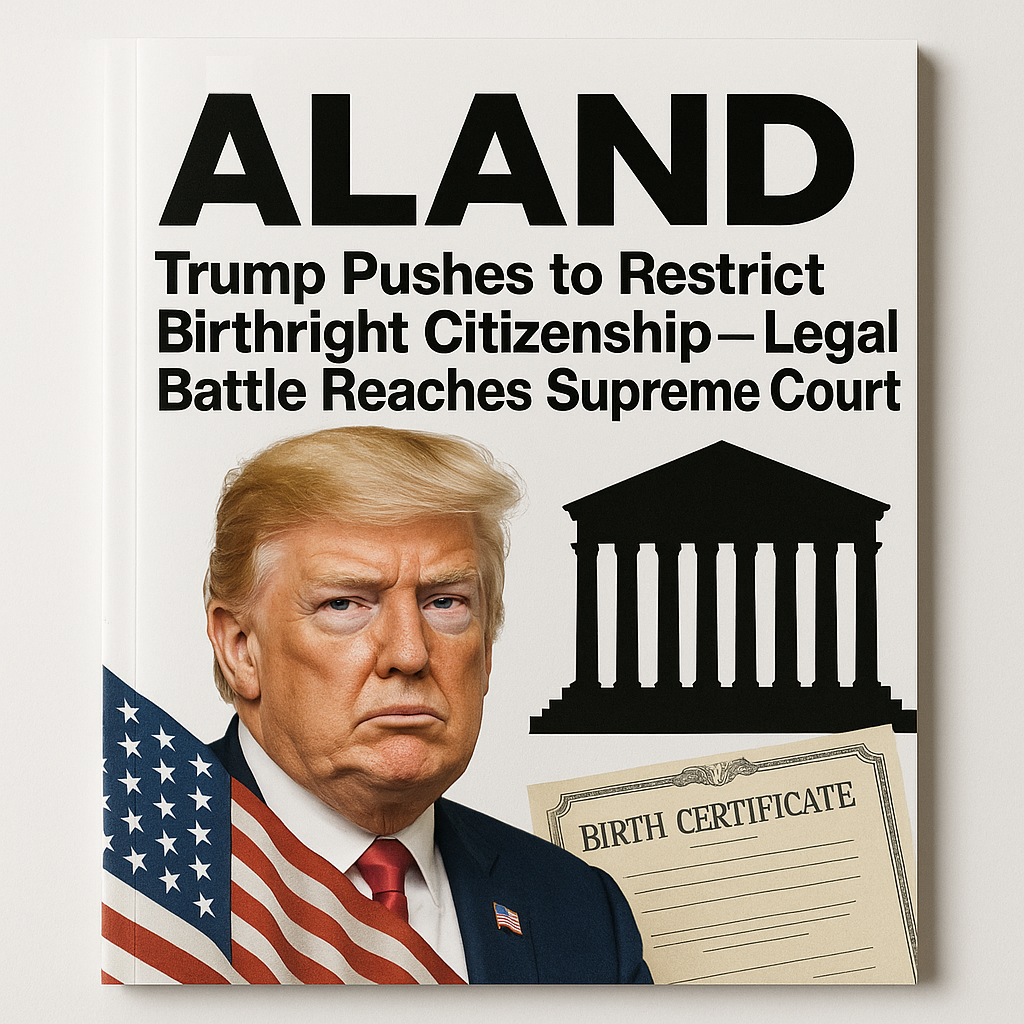Trump Pushes to Restrict Birthright Citizenship — Legal Battle Reaches Supreme Court
Published Date: 28th Sep, 2025
Washington, D.C. — Former President Donald Trump is intensifying efforts to revoke or curtail the long-standing principle of birthright citizenship in the United States—one that grants citizenship to virtually anyone born on U.S. soil under the 14th Amendment. His administration has formally asked the U.S. Supreme Court to overturn lower-court rulings that blocked the policy, escalating a deeply contentious constitutional fight.
What Trump Is Trying to Do
On his first day back in office (January 20, 2025), Trump signed Executive Order 14160, titled “Protecting the Meaning and Value of American Citizenship.”
The order directs federal agencies to deny U.S. citizenship to children born in the U.S. if their parents are unauthorized immigrants or are in the country temporarily (such as on visas), unless at least one parent is a U.S. citizen or lawful permanent resident.
The policy would apply only to children born 30 days or more after the order’s signing—that is, starting February 19, 2025.
The administration frames the change as necessary to curb “birth tourism” and reduce incentives for undocumented immigration. However, legal experts and opponents argue that the proposal runs directly counter to the clear language of the 14th Amendment, which guarantees citizenship to “all persons born or naturalized in the United States, and subject to the jurisdiction thereof.”
Court Battles and Recent Rulings
Lower Courts Block the Order
Almost immediately, multiple lawsuits challenged the executive order. Federal district judges in Washington state, Maryland, Massachusetts, and New Hampshire issued nationwide injunctions to block the order from taking effect, citing constitutional grounds.
In Washington v. Trump, for instance, Judge John Coughenour labeled the order “blatantly unconstitutional.”
Supreme Court Limits Nationwide Injunctions
On June 27, 2025, the Supreme Court issued a 6–3 decision in Trump v. CASA, Inc., not on the constitutionality of the order, but on the scope of judicial relief. The Court ruled that federal district courts generally cannot issue broad, universal injunctions blocking a policy nationwide; their orders must be tailored to the specific plaintiffs before them.
This ruling eased one obstacle for the Trump administration: it opened the door for the executive order to take effect in states that are not covered by existing injunctions.
However, the Supreme Court did not rule on whether Trump’s birthright citizenship restrictions themselves are constitutional.
Mixed Decisions Below
-
In July 2025, the 9th U.S. Circuit Court of Appeals reaffirmed a block on the order in a 2–1 decision, finding it unconstitutional and arguing that a narrower injunction would fail to protect affected states adequately.
-
Around the same time, a federal judge in Boston issued another injunction prohibiting enforcement, citing constitutional concerns and criticizing the policy’s potential harm to states and families.
-
In New Hampshire, in the class-action case Barbara v. Trump, Judge Joseph Normand Laplante granted a class-wide injunction covering children who might lose citizenship under the order.
As of now, the order remains blocked in many places, but its future depends on how the Supreme Court and lower courts resolve constitutional questions.
What Happens Next?
Trump’s administration has now formally petitioned the Supreme Court to uphold the birthright citizenship ban and lift the remaining injunctions.
If the Court agrees to hear the case on its merits, it could deliver a landmark ruling reinterpreting the 14th Amendment, potentially reshaping U.S. citizenship law.
The administration also faces logistical and legal challenges in trying to enforce the policy even in states not currently blocked by courts—or in areas where class-action protections apply.
Opponents—including civil rights groups, immigrant advocates, and state attorneys general—are preparing for a Supreme Court showdown and continuing to file lawsuits.
Reactions & Stakes
Supporters of the policy see it as a bold corrective measure, arguing that birthright citizenship was never intended to apply to children of noncitizen parents and that the change would curb illegal immigration.
Critics argue it is unconstitutional, breaks with centuries of legal precedent (notably the Wong Kim Ark decision in 1898), and threatens to create stateless children and massive legal confusion.
For families and immigrants, the uncertainty is profound. Pregnant people and those planning to have children face a legal limbo: will their child automatically be a U.S. citizen, or be denied citizenship under the new rules?
Because the underlying constitutional questions remain unresolved, the full impact of Trump’s proposed changes is still unfolding. The Supreme Court’s eventual ruling could either cement or overturn generations of understanding about U.S. citizenship.
Date: 28th Sep, 2025

